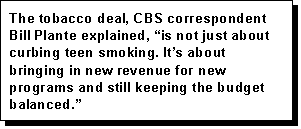 |
|||||||||
|
 |
||
|
 |
||||||||||||||||||||||||
|
||||||||||||||||||||||||
 |
||||||
|
||||||
 |
||||||
|
 |
||||||||||||||||||
|
||||||||||||||||||
 |
||||||||||||||||||||||||
|
||||||||||||||||||||||||
 |
||||||||||||||||||
|
||||||||||||||||||
|
|
|
Thursday, April 30, 1998 - Vol. Two, No. 18 - Media Inquiries: Keith Appell (703) 683-5004

Networks Fail to Report that Proposed Tobacco Tax Increases Target Low-Income Americans Washington Soaks Poor, Reporters Yawn Big tobacco has been big news at the networks this month. Between April 1 and April 26 on ABC World News Tonight, CBS Evening News, and NBC Nightly News, there were 23 stories about various aspects of federal tobacco legislation. But, amazingly, none of these stories mentioned the argument that the proposed new taxes on cigarettes would hit poorer Americans most heavily. This is a startling omission for reporters whose first question about tax legislation is almost always, "Is it fair?"
This is not to say that there hasn't been some skepticism at the networks about Washington's obsession with tobacco. In an April 8 CBS Evening News story, for example, correspondent Bill Plante explained the political motivations behind Washington's tobacco fixation. The tobacco deal, he reported, "is not just about curbing teen smoking. It's about bringing in new revenue for new programs and still keeping the budget balanced." On that same evening's Nightly News, NBC correspondent Bob Kur noted that "even tobacco's toughest critics say Washington's money grab is out of control." Ten days later, Plante's CBS colleague Jim Stewart reported on the possible consequences of White House plans to "regulate the entire distribution chain for tobacco products" in order to combat a possible black market in cigarettes after the tax increase. "The administration seems to be positioning itself to counter any and every argument by big tobacco that a big new tax and a comprehensive settlement won't work," Stewart reported. "This is one tactic, however, with a lot of risk. Requiring every mom-and-pop grocer in the country to register with the ATF comes awfully close to establishing what no one wants to see come out of a tobacco deal -- a national tobacco police." These are important issues, but no reporter considered it newsworthy that the government was planning a steep tax increase on ordinary Americans. This isn't the first time tobacco reporting has been wide but not deep. An October, 1996 Free Market Project study found that between August 1, 1995 and July 31, 1996 there were 413 network news stories about tobacco and smoking, which was more coverage than that given to all illegal drugs combined. And in these tobacco stories, soundbites from pro-regulation sources outnumbered soundbites from anti-regulation sources by almost three to one, with most of the anti-regulation soundbites coming from the tobacco industry. Until reporters realize that there are anti-regulation and anti-taxation arguments that are not pro-smoking, tobacco coverage will continue to lack depth. -- Tim Lamer
Home | News Division
| Bozell Columns | CyberAlerts |







 Just how regressive would proposed tobacco
tax increases be? In the bill offered by Senator John McCain, notes Patrick Fleanor of the
Tax Foundation (as reported by Paul Gigot in the April 10 Wall Street Journal),
about 34 percent of the $1.21 per-pack increase would be paid by those who make less than
$15,000 per year. Those earning less than $35,000 would pick up 59 percent of the tab,
while only two percent of the new taxes would be paid by those making more than $150,000.
According to Gigot, the average two-smoker household "would pay some $1,327 a year
more by 2003."
Just how regressive would proposed tobacco
tax increases be? In the bill offered by Senator John McCain, notes Patrick Fleanor of the
Tax Foundation (as reported by Paul Gigot in the April 10 Wall Street Journal),
about 34 percent of the $1.21 per-pack increase would be paid by those who make less than
$15,000 per year. Those earning less than $35,000 would pick up 59 percent of the tab,
while only two percent of the new taxes would be paid by those making more than $150,000.
According to Gigot, the average two-smoker household "would pay some $1,327 a year
more by 2003." 